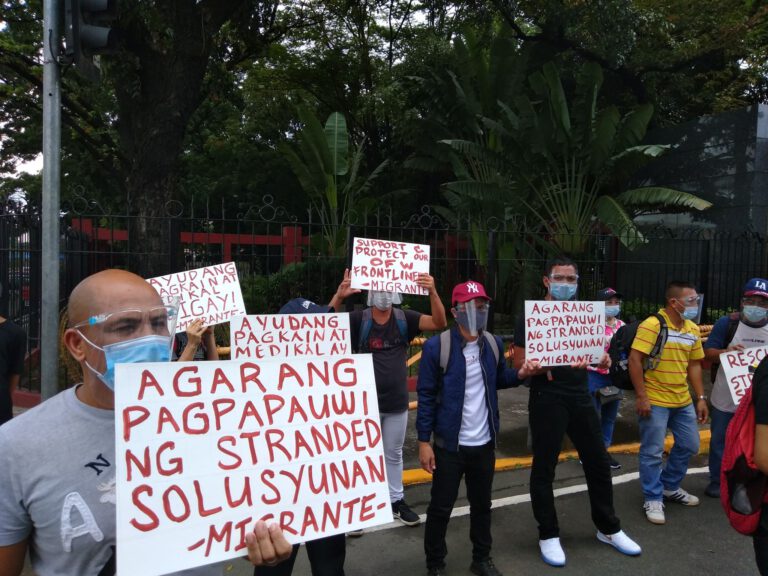
Press Statement
December 10, 2022
Today, the 74th anniversary of the ratification of the Universal Declaration of Human Rights (UDHR) and celebration of the International Human Rights Day, Migrante International asserts that the international migration of Filipinos is surrounded by violations of Filipinos’ most basic human rights.
The theme chosen by the United Nations for its year-long celebration of the 75th anniversary of the UDHR next year, “Dignity, Freedom, and Justice for All,” captures ideals that have been consistently denied to Filipinos both in the Philippines and abroad.
Most responsible for the violations of Filipinos’ human rights is the main duty bearer in upholding these rights — the Philippine State.
We cite the following timely illustrations:
>> Because of the lack of agricultural and industrial development in the Philippines, Filipinos are denied the right to work and to just and favorable conditions of work. Most of the jobs in the Philippines are characterized by low wages, lack of security of tenure, and violation of union rights. This is the condition that push Filipinos to migrate.
>> Many Filipinos are victimized by human trafficking, a wholesale violation of many human rights from the right to equality, dignity and rights to the right to freedom from slavery and from torture or to cruel, inhuman or degrading treatment or punishment. In 2020, 52 women and girls who were trafficked to Syria as domestic workers sought assistance from the Philippine Embassy and were maltreated, denied their right to public service.
>> While the country produces more nurses than it needs, most Filipinos are denied the right to a standard of living adequate for their health and well-being, including medical care and necessary social services. Hospitalization is very expensive, health services through PhilHealth are not free, and Filipinos are forced to ask politicians for help.
>> There are 56 Filipinos who are in jail and on death row in various countries, according to the Department of Foreign Affairs. Most of them have been denied the right to equal protection of the law and to full equality to a fair and public hearing by an independent and impartial tribunal. In most cases, the Philippine State has failed to provide any protection or assistance to them.
>> Since 2015-2016, more than 10,000 Filipino construction workers in Saudi Arabia were denied the right to an effective remedy by the competent national tribunals for acts violating their fundamental rights. They were retrenched from work and not given their wages and benefits, but the Philippine government is taking a long time to pursue their claims. Despite Saudi prince’s pledge to pay their backwages, we still need to ensure that all of them get their due.
>> A majority of the more than 250,000 Filipino seafarers are contractuals, whose security of tenure is limited to their short-term contracts, and who are denied their separation and retirement pay. This is a violation of their right to security of tenure, which is part of their right to just and favorable conditions of work. The Magna Carta for Seafarers, currently pending in Congress, must ensure that seafarers enjoy this most fundamental of labor rights.

The history of human rights is clear: advances are not achieved by the approval of laws and agreements about human rights alone, but by the struggles of the rights holders through their social movements, often forcing the State, the duty bearer, to protect and promote these rights.
We therefore mark the 74th anniversary of the UDHR by continuing the campaigns and struggles of migrant Filipinos for better working and living conditions, and for an end to the labor export program and for decent jobs in the Philippines. We call on all migrant Filipinos to unite, form organizations, and collectively work to claim their rights.###
